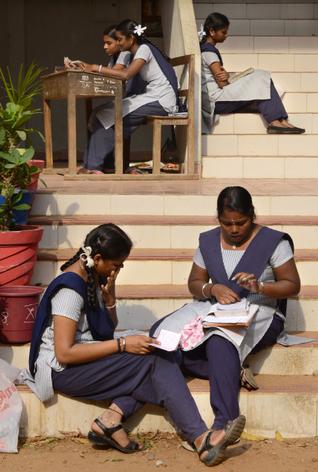 April 20: In another month or so, we will read reports of the number of students who secured centum in mathematics, chemistry, or computer science. “My parents suspended our cable TV connection during examinations. I did my daily lessons regularly and did not go for tuitions. I thank my teachers for their support,” a top rank holder will say. “I expected a total above 1,000, but did not think I would top,” another will say, in apparent disbelief. After interviewing such candidates (we have been receiving mixed responses to the extent of our coverage of Plus Two results), I would invariably come back troubled.
April 20: In another month or so, we will read reports of the number of students who secured centum in mathematics, chemistry, or computer science. “My parents suspended our cable TV connection during examinations. I did my daily lessons regularly and did not go for tuitions. I thank my teachers for their support,” a top rank holder will say. “I expected a total above 1,000, but did not think I would top,” another will say, in apparent disbelief. After interviewing such candidates (we have been receiving mixed responses to the extent of our coverage of Plus Two results), I would invariably come back troubled.
Their academic achievement may be commendable in today's competitive context, but most of the top scorers have very similar things to say, from what they did to emerge successful to what they wish to do next – often medicine, engineering, chartered accountancy or civil services. This is not to say that these students lack creativity, but to point to one of the most disturbing impacts of the high-pressure schooling experience they have had. These are students who have spent much of their childhood in a world that values nothing but high academic achievement.
In this context, School Education Minister N. R. Sivapathy's recent announcement on the "Tamil Nadu Curricular Framework 2012' brings some promise, for it is an opportunity to review the state's school education system in its entirety.
It is not as if Tamil Nadu has never attempted changing its approach to teaching and learning. There are periodic syllabus revisions, and more importantly, the State has seen certain progressive pedagogic interventions such as the Activity Based Learning (ABL) and Active Learning Methodologies (ALM).
All the same, the focus, particularly in higher classes, is clearly on students' achievements and their comprehension. This attitude has, besides breeding a culture of rote learning, also nurtured an atmosphere of unbelievable high pressure. Students are left disillusioned, batch after batch. For some, this "hangover' lasts until they get out of college. Any attempt to challenge this culture of schooling has to begin at primary school. In that, the State is on the right track, with the ABL and ALM in place. The State Board is also set to adopt Continuous and Comprehensive Evaluation (CCE) from the coming academic year. But the real challenge is to carry the same spirit all through schooling, right up to the higher secondary level.
This is where Tamil Nadu is clearly in a danger zone, where competition and pressure are rather intense. Several residential schools along the Namakkal belt that are known to adopt a regimented approach to training plus two students, have, in fact, been building brand images as institutions that coach students to emerge as toppers. Their students may obtain high scores, but not many of them would have had the opportunity to experience the joy in learning and understanding. The sense of wonder they had as children would have also died a natural death by then. If the proposed curricular framework is successful in restoring that sense of wonder, in addition to equipping students to face contemporary challenges of today's highly competitive world, it will truly be a historic step.
For that purpose, Tamil Nadu will do well to reflect on the recommendations made in vision documents such as the Yashpal Committee Report (1993) on "Learning without burden' and the more recent National Curriculum Framework (NCF) 2005, and suitably incorporate them into its own curricular framework. The NCF says "The fact that learning has become a source of burden and stress on children and their parents is evidence of a deep distortion in educational aims and quality', and makes important recommendations, such as connecting knowledge to life outside school, and making examinations more flexible and integrating them with classroom life.
The State has now embarked upon a crucial exercise that has the potential to bring about a radical change in the school education space. The new curricular framework will be eagerly awaited.






Comments
Add new comment